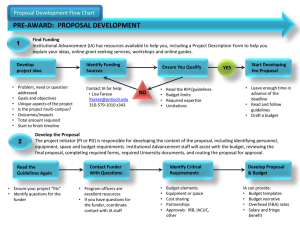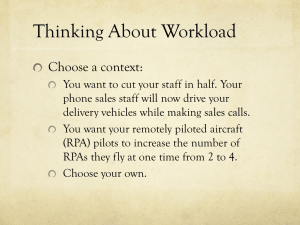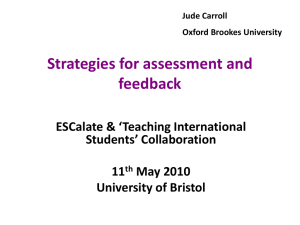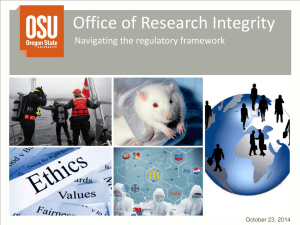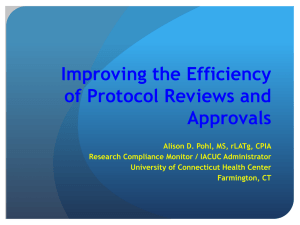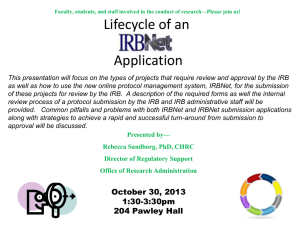Faculty Workload Survey (FWS) II
advertisement
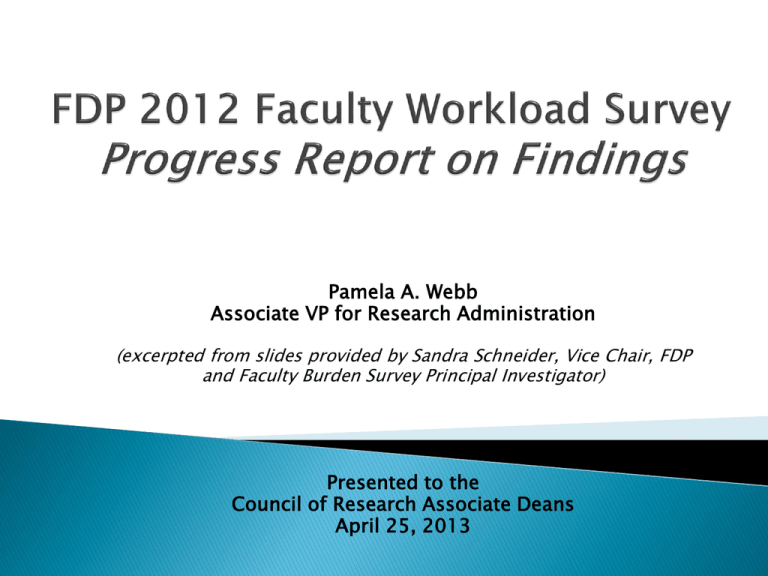
Pamela A. Webb Associate VP for Research Administration (excerpted from slides provided by Sandra Schneider, Vice Chair, FDP and Faculty Burden Survey Principal Investigator) Presented to the Council of Research Associate Deans April 25, 2013 Purposes: ◦ Assess changes or additions to administrative burdens since Faculty Workload Survey #1 in 2005 (e.g., ARRA) ◦ Obtain more detailed information about specific burdens (e.g., IRB, IACUC) Goals: ◦ To increase the likelihood of efficient and effective demonstration projects ◦ Provide information to FDP and federal agencies to facilitate targeted reduction of administrative burden FWS II Task Force FWS II Research Team ◦ Randy Brutkiewicz, Indiana University ◦ Laura Lang, Florida State University ◦ Kiri Ness, St. Jude Research Hospital ◦ Sara Rockwell, Yale University ◦ Joshua Rosenbloom, University of Kansas ◦ Sandra Schneider (Chair), University of South Florida ◦ Kelly Shaver, College of Charleston ◦ Jennifer Wisdom, Columbia University Principal Investigator: Sandra Schneider (USF), FDP Vice Chair Project Manager: David Wright, FDP Executive Director Data Collection support: Survey Sciences Group, LLC Scott Crawford, SSG Executive Director Brian Hempton, SSG Study Director Research Assistant: Nate Decker, Univ. of South Florida IRB Approval: September 2011 (U of South Florida) Conducted: January 23, 2012- March 22, 2012 Prelim Analysis: August 2012 Full Report: Spring 2013 2005 Participants = 6,295 2012 Participants = 13,453 (26% response rate) 12,816 with complete data From 99 FDP Institutions Q1-Q4 Basic Work Background Q5-Q6 Breakdown of Work Time Q7-Q9 Federally-funded Research Overview Eligible to participate if: Q10-13 Administrative Workload 1) PI of a federally funded on Federally-funded project in FY10-11 Projects 2) At an FDP institution Q14-16 Demographic Information Q17 Perspectives on Funded Research and Administrative Workload Workload on Federally-funded Projects 2005 PostAward Activities, 19.7% PreAward Activities, 22.6% Active Research, 57.7% 2012 PostAward Activities, 21.2% PreAward Activities, 21.1% Active Research, 57.7% 42% of PI’s federally-funded research time is spent completing pre- and post-award requirements. On average, which types of administrative responsibilities are taking away the most time from active research? 20.0% % Federal Research Time Devoted to Administrative Responsibilities 15.0% 10.0% 5.0% 0.0% Proposal Preparation Pre-Award Administration Post-Award Administration Report Preparation Proposal and Report Preparation takes up almost one quarter of the average PI’s federal research time. Question: What are the administrative issues that are most burdensome about proposal preparation? • Constantly changing requirements, formats and content • Wasted time filling out numerous documents when the vast majority of proposals will not be funded • Detailed budgets despite low likelihood of funding • Different requirements from different agencies; different forms (CVs, budgets, etc.) • Increasing requirements with decreasing funding rates • Emphasis within proposal on procedure and data that are not directly relevant to the research Question: What are the administrative issues that are most burdensome about report preparation? • • • • • • Constantly changing requirements, formats, and content Routine, redundant, detailed interim reports that no one reads Different requirements from different agencies; complex forms Requirements are too frequent and overly detailed; tedious Ambiguities in requirements; poor fit of forms to actual research Online submission is “user unfriendly” 20.0% % Federal Research Time Devoted to Administrative Responsibilities 15.0% 10.0% 5.0% 0.0% Proposal Preparation Pre-Award Administration Post-Award Administration Report Preparation Pre-Award and Post-Award Administration takes up almost one fifth of the average PI’s federal research time. What are the most common pre-award and post-award administrative responsibilities? 100% Prevalence of Administrative Responsibilities 90% Percentage of Participants 80% 70% 60% 50% 40% 30% 20% 10% 0% Administrative Workload Type What are the most intensive pre-award and post-award administrative responsibilities? 0% Administrative Workload Type COI PCII (For DHS) RCR RECOMBINANT DNA EXPORT CONTROLS DATA SHARING CONTR.… HIPAA CHEMICAL SAFETY RADIATION SAFETY BIOSAFETY SELECT AGENTS GENERAL LAB… INTELLECTUAL PROPERTY ARRA EFFORT REPORTING 100% CROSS-AGENCY… SUBCONTRACTS CLINICAL TRIALS PERSONNEL FINANCES (Non-ARRA) IRB IACUC Percentage of Participants % Reporting Substantial Time Taken by Administrative Responsibilities 90% 80% 70% 60% 50% 40% 30% 20% 10% Over 80% of PIs report having time taken away from research in order to deal with Finances, Personnel and Effort Reporting. 2012 Burden Drill-Down (Initial N=12816) FINANCES--Non-ARRA (N=7531) Managing budget-to-actual expenses Dealing with equipment and supplies purchases Determining and justifying which tasks and related costs are allowable as direct charges Meeting other fed. cost accounting standards (incl. budget transfers, spending Completing training regarding budgets/expenditures on federal projects Requesting meeting and tracking federally-mandated cost-share requirements PERSONNEL (N=7240) Managing personnel Hiring personnel Evaluating personnel Dealing with issues related to visas EFFORT REPORTING (N=5041) Completing federal time and effort reports for myself Completing federal time and effort reports for others Completing training regarding time and effort reporting on federal projects Mean 1=None – 5=Very much 3.09 2.89 2.34 2.09 1.74 1.71 3.55 2.99 2.95 1.89 2.66 2.37 2.08 Over 50% of those who experience the responsibilities report that IRB, Finances, Personnel, Clinical Trials, and Subcontracts require substantial time away from research. 2012 Burden Drill-Down (continued) IRB (N=3897) Preparing IRB protocols and consent forms for initial review Completing protocol revisions requested by reviewers Waiting for feedback from review Completing annual continuing review of protocols Ensuring that study procedures meet protocols Fulfilling federal requirements for training in human subjects protections CLINICAL TRIALS (N=880) Posting and updating trial progress to meet federal requirements Completing training regarding federal requirements for clinical trials Posting and updating trial results to meet federal requirements SUBCONTRACTS (N=3354) Overseeing progress toward project goals and deadlines Overseeing budgets, expenditures, invoices and other financial matters Overseeing compliance and safety/security issues Dealing with management issues specific to international subcontracts Mean 1=None – 5=Very much 3.50 3.04 3.00 2.92 2.87 2.64 2.51 2.36 2.36 3.31 3.21 2.07 1.75 Although not as prevalent, almost 80% of those who have IACUC responsibilities report that it takes substantial time away from research. 2012 Burden Drill-Down (continued) IACUC (N=2513) Preparing IACUC protocols for initial review Completing annual IACUC reviews and three-year re-writes of protocols Completing protocol revisions requested by reviewers Fulfilling federal requirements for training in animal care and use Satisfying federal requirements for funded projects (e.g. tracking animal numbers) Maintaining veterinary medical records Mean 1=None – 5=Very much 3.62 3.38 3.29 2.75 2.63 2.25 Preparing IACUC protocols for initial review Managing personnel Preparing IRB protocols and informed consent for initial review Annual IACUC reviews and 3-year reviews Overseeing subaward technical progress Completing revisions requested by IACUC reviewers Overseeing subaward financial progress/invoices Comparing budget-to-actual expenditures Completing revisions requested by IRB reviewers Waiting for feedback from review 3.62 3.55 3.50 3.38 3.31 3.29 3.21 3.09 3.04 3.00 Does workload vary by principal field? FWS Breakdown of Participants by Principal Field Principal Field Bio & Biomed Phys Sci and Math Engrg & Comp Sci Social and Beh Sci Clinical Sci & Med Agrl Sciences Education Humanities Business Arts & Arch Other 32.3% 16.3% 13.7% 12.1% 9.5% 4.1% 3.1% 0.9% 0.4% 0.3% 7.2% % Time Taken from Federal Research 55 50 45 40 35 Differences in % Time Away by Principal Field Does workload vary by agency? % Time Taken from Federal Research 65 60 55 50 45 40 35 Differences in % Time Away, by Funding Agency Question: What factors are associated with higher and lower levels of administrative responsibilities? Consider: • Academic Rank • • • • • • Administrative Role Type of Project Amount of Funding Principal Field of Research Funding Agency Demographics Question: What factors are associated with higher and lower levels of administrative responsibilities? In no area is time taken away from research less than 35% and often it is over 50%. Factors associated with greater federal administrative responsibility include: • Non-professor positions • Administrative appointments • Service, Training, Curriculum and other non-research-focused projects • Higher combined direct costs; more projects • Smaller, non-doctoral or specific focus institutions • Smaller funding agencies • Females; Hispanic/Latino or African American Question: What factors are associated with higher and lower levels of administrative responsibilities? • Differences in post-award administrative responsibilities, and to a lesser degree, report preparation account for most differences in administrative responsibilities. • Proposal preparation tends to reliably account for about 15% of federal research time • Pre-award administration hovers around 6%. 35 Differences in % Time Away by Funding Agency % Time Taken from Federal Research Proposal Preparation 30 Pre-Award Admin Post-Award Admin 25 20 15 10 5 0 Report Preparation To what extent do PIs feel they could benefit from additional administrative assistance? ◦ Generally, the greater the time away from research, the larger the estimated potential reduction. ◦ Of greatest benefit to those using Human Subjects or having General Compliance responsibilities 25-40% Sample Research Workload Opinion Items Administrative workload associated with federallyfunded research grants has increased in the last 5 or 6 years. The federally-mandated requirements for research accomplish their intended goals. The time spent meeting federal requirements for research provides benefit worth the cost. Because of research administrative workload, I am generally less willing to submit federal grant proposals than in the past. When I have questions about federal regulations related to research, obtaining answers is straightforward. 2012 %Agree 68% 26% 21% 26% 21% http://sites.nationalacademies.org/PGA/fdp/PGA_081164 Scroll down to second to last hyperlink on this page to view the 92 slides that make up the full presentation
